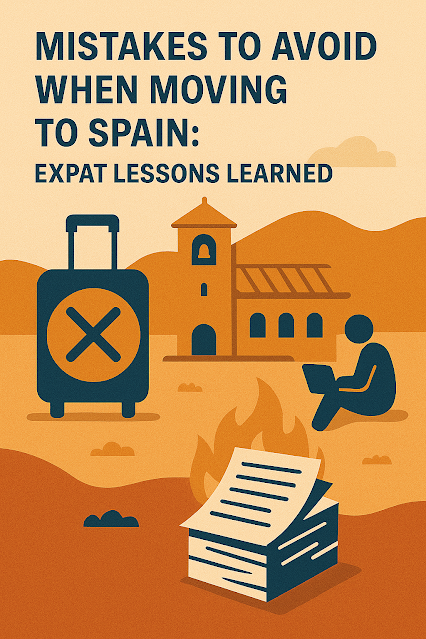Moving to Spain can be exciting—but without proper planning, it’s easy to make avoidable mistakes. Based on real experiences from expats, this guide will help you dodge the common pitfalls and settle smoothly in 2025.
🚫 Mistake 1: Underestimating Bureaucracy
Spain is known for its slow and complex paperwork. Spain Digital Nomad Visa applications, residency permits, and public registrations take time and patience.
What to do: Always bring extra copies of documents, double-check requirements online, and prepare for multiple visits to government offices.
💸 Mistake 2: Misjudging the Cost of Living
Spain is affordable—but not everywhere. Cities like Madrid and Barcelona can be pricey, especially for rent and dining out.
What to do: Research cost of living by city. Explore affordable alternatives like Valencia, Málaga, or smaller towns.
🏠 Mistake 3: Rushing to Rent or Buy Property
Signing a long-term lease or buying a home too quickly is risky. Many expats regret choosing the wrong area or not understanding local contracts.
What to do: Start with a short-term rental. Spend time in different neighborhoods before making a commitment.
🗣️ Mistake 4: Not Learning Spanish
While English is spoken in tourist areas, Spanish is essential for everyday life—banking, healthcare, and local friendships.
What to do: Enroll in language classes or use apps. Practice daily and learn local phrases and cultural norms.
📄 Mistake 5: Not Understanding Your Visa Rules
Overstaying a tourist visa or working on the wrong visa can have legal consequences.
What to do: Choose the correct visa (non-lucrative, digital nomad, student, etc.) and understand its restrictions.
⚠️ Mistake 6: Ignoring Tax Obligations
Even if your income is from abroad, you may owe taxes in Spain. Many expats don’t realize this until it's too late.
What to do: Speak to a tax advisor who understands expat taxation and the Spain-U.S./UK/etc. tax treaties.
🌍 Mistake 7: Failing to Integrate
Some expats isolate themselves in “foreign bubbles,” missing out on the full Spanish experience.
What to do: Join local events, take part in community life, and befriend locals to feel truly at home.
💡 Final Thoughts
Spain offers a vibrant, sunny lifestyle—but success depends on preparation. By learning from the mistakes of others, you can make your transition smoother and more rewarding. Take your time, do your research, and embrace the journey.
Want more tips? Check out our guides on residency options, cost of living, and freelancing or working legally in Spain.
🎥 Looking for more insights? Here's a helpful video that complements this topic:


0 comments:
Post a Comment